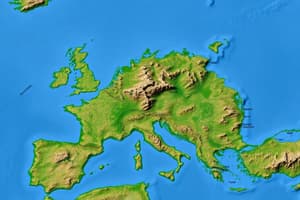Podcast
Questions and Answers
Why is georeferencing essential in GIS?
Why is georeferencing essential in GIS?
To locate and combine datasets accurately.
What is the purpose of the British National Grid coordinate system?
What is the purpose of the British National Grid coordinate system?
To provide a projected coordinate system for locating and referencing spatial data.
Why is it necessary to join attributes from tables to feature class datasets?
Why is it necessary to join attributes from tables to feature class datasets?
To include attributes of interest that may not be present in the original GIS dataset.
What is a principle of good database design related to storing attributes in GIS datasets?
What is a principle of good database design related to storing attributes in GIS datasets?
What is the focus of mapping in GIS when using choropleth (graduated colour) maps?
What is the focus of mapping in GIS when using choropleth (graduated colour) maps?
Why might attributes of interest in GIS datasets start their life in formats like spreadsheets or csv files?
Why might attributes of interest in GIS datasets start their life in formats like spreadsheets or csv files?
What is the purpose of a 'Spatial Join' function in ArcGIS?
What is the purpose of a 'Spatial Join' function in ArcGIS?
Define Georeferencing in the context of GIS.
Define Georeferencing in the context of GIS.
What is the Default geodatabase in ArcGIS?
What is the Default geodatabase in ArcGIS?
What is the purpose of Metadata in GIS?
What is the purpose of Metadata in GIS?
Explain the concept of Choropleth mapping.
Explain the concept of Choropleth mapping.
What does Aggregate data refer to in GIS?
What does Aggregate data refer to in GIS?
What is the difference between a vector data model and a raster data model?
What is the difference between a vector data model and a raster data model?
What type of data does thematic data represent?
What type of data does thematic data represent?
What does Continuous data represent?
What does Continuous data represent?
What is the purpose of Digital Terrain Models (DTM)?
What is the purpose of Digital Terrain Models (DTM)?
What does Slope aspect in DEM identify?
What does Slope aspect in DEM identify?
What does Offset height refer to in spatial data analysis?
What does Offset height refer to in spatial data analysis?
Flashcards are hidden until you start studying
Study Notes
Importance of Georeferencing in GIS
- Georeferencing aligns spatial data with geographic coordinates, enabling accurate mapping and analysis.
- Essential for integrating various datasets and ensuring they overlay correctly on a map.
British National Grid Coordinate System
- Provides a standardized reference system across Great Britain for mapping and navigation.
- Facilitates easy communication and sharing of geographic information within the region.
Joining Attributes to Feature Class Datasets
- Necessary for enriching spatial data with additional information, enhancing analysis capabilities.
- Allows for more detailed queries and better decision-making based on combined datasets.
Good Database Design in GIS
- Emphasizes normalization, ensuring attributes are stored efficiently and minimizing redundancy.
- A well-structured database improves data integrity and ease of access.
Focus of Mapping Using Choropleth Maps
- Aims to visualize data distribution, representing statistical values using different colors.
- Useful for identifying patterns and trends across geographic areas.
Origin of Attributes in GIS Datasets
- Often started in spreadsheets or CSV files for ease of data entry and management.
- Standard formats allow for straightforward import into GIS software for further analysis.
Purpose of 'Spatial Join' in ArcGIS
- Combines spatial and attribute data from two layers based on their geographic relationships.
- Enhances datasets by merging relevant information without altering original data.
Definition of Georeferencing in GIS
- The process of assigning precise geographic coordinates to spatial data, allowing it to align with real-world locations.
Default Geodatabase in ArcGIS
- The initial database used by ArcGIS to store and manage spatial data.
- Serves as a primary location for organizing and accessing GIS resources.
Purpose of Metadata in GIS
- Provides crucial information about data, including source, accuracy, and usage constraints.
- Enhances data discoverability and promotes effective data management practices.
Concept of Choropleth Mapping
- A thematic mapping technique where areas are shaded or patterned in relation to a value.
- Facilitates the visualization of quantitative data distribution across different regions.
Definition of Aggregate Data in GIS
- Data summarized from detailed datasets often used for analysis at a higher level.
- Useful in identifying overall trends and patterns across larger geographic areas.
Difference Between Vector and Raster Data Models
- Vector data represents discrete features with defined boundaries (points, lines, polygons).
- Raster data consists of grid cells representing continuous data, typically used for imagery and surface modeling.
Thematic Data Representation
- Thematic data conveys specific themes or topics, such as demographics or land use, within a geographic context.
Continuous Data Representation
- Represents data that can take any value within a range, often used for measurements like temperature or elevation.
Purpose of Digital Terrain Models (DTM)
- Provide detailed representations of the terrain's surface, including elevation and slope changes.
- Essential for modeling, simulation, and analysis in various applications like environmental studies and urban planning.
Slope Aspect in Digital Elevation Models (DEM)
- Identifies the direction the slope faces, influencing factors like sunlight exposure and water runoff.
- Important for ecological and agricultural assessments.
Offset Height in Spatial Data Analysis
- Refers to the measurement of vertical distance between two different elevation points or surfaces.
- Useful in understanding topography and analyzing geographic features.
Studying That Suits You
Use AI to generate personalized quizzes and flashcards to suit your learning preferences.




